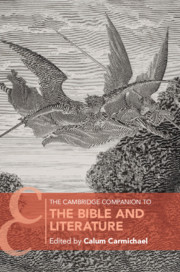32 results
Index
-
- Book:
- The Cambridge Companion to the Bible and Literature
- Published online:
- 13 March 2020
- Print publication:
- 26 March 2020, pp 273-274
-
- Chapter
- Export citation
Abbreviations
-
- Book:
- The Cambridge Companion to the Bible and Literature
- Published online:
- 13 March 2020
- Print publication:
- 26 March 2020, pp ix-x
-
- Chapter
- Export citation
Copyright page
-
- Book:
- The Cambridge Companion to the Bible and Literature
- Published online:
- 13 March 2020
- Print publication:
- 26 March 2020, pp iv-iv
-
- Chapter
- Export citation
Introduction
-
- Book:
- The Cambridge Companion to the Bible and Literature
- Published online:
- 13 March 2020
- Print publication:
- 26 March 2020, pp 1-6
-
- Chapter
- Export citation
Contributors
-
- Book:
- The Cambridge Companion to the Bible and Literature
- Published online:
- 13 March 2020
- Print publication:
- 26 March 2020, pp vii-viii
-
- Chapter
- Export citation
Contents
-
- Book:
- The Cambridge Companion to the Bible and Literature
- Published online:
- 13 March 2020
- Print publication:
- 26 March 2020, pp v-vi
-
- Chapter
- Export citation
4 - Biblical Law and Literature
-
-
- Book:
- The Cambridge Companion to the Bible and Literature
- Published online:
- 13 March 2020
- Print publication:
- 26 March 2020, pp 63-79
-
- Chapter
- Export citation

The Cambridge Companion to the Bible and Literature
-
- Published online:
- 13 March 2020
- Print publication:
- 26 March 2020
Bibliography
-
- Book:
- The Sacrificial Laws of Leviticus and the Joseph Story
- Published online:
- 30 August 2017
- Print publication:
- 18 August 2017, pp 189-193
-
- Chapter
- Export citation
3 - Inadvertent Offenses (Lev 4)
-
- Book:
- The Sacrificial Laws of Leviticus and the Joseph Story
- Published online:
- 30 August 2017
- Print publication:
- 18 August 2017, pp 60-76
-
- Chapter
- Export citation
Subject Index
-
- Book:
- The Sacrificial Laws of Leviticus and the Joseph Story
- Published online:
- 30 August 2017
- Print publication:
- 18 August 2017, pp 194-195
-
- Chapter
- Export citation
Introduction
-
- Book:
- The Sacrificial Laws of Leviticus and the Joseph Story
- Published online:
- 30 August 2017
- Print publication:
- 18 August 2017, pp 1-14
-
- Chapter
- Export citation
6 - Joseph’s Banquet and Wellbeing Offerings (Lev 7:11–36)
-
- Book:
- The Sacrificial Laws of Leviticus and the Joseph Story
- Published online:
- 30 August 2017
- Print publication:
- 18 August 2017, pp 124-144
-
- Chapter
- Export citation
Abbreviations
-
- Book:
- The Sacrificial Laws of Leviticus and the Joseph Story
- Published online:
- 30 August 2017
- Print publication:
- 18 August 2017, pp ix-x
-
- Chapter
- Export citation
8 - Impact of the Golden Calf on Narratives and Rules (Lev 9–10)
-
- Book:
- The Sacrificial Laws of Leviticus and the Joseph Story
- Published online:
- 30 August 2017
- Print publication:
- 18 August 2017, pp 159-173
-
- Chapter
- Export citation
9 - Interpreting Law
-
- Book:
- The Sacrificial Laws of Leviticus and the Joseph Story
- Published online:
- 30 August 2017
- Print publication:
- 18 August 2017, pp 174-188
-
- Chapter
- Export citation
Contents
-
- Book:
- The Sacrificial Laws of Leviticus and the Joseph Story
- Published online:
- 30 August 2017
- Print publication:
- 18 August 2017, pp v-vi
-
- Chapter
- Export citation
Index of References
-
- Book:
- The Sacrificial Laws of Leviticus and the Joseph Story
- Published online:
- 30 August 2017
- Print publication:
- 18 August 2017, pp 196-202
-
- Chapter
- Export citation
Copyright page
-
- Book:
- The Sacrificial Laws of Leviticus and the Joseph Story
- Published online:
- 30 August 2017
- Print publication:
- 18 August 2017, pp iv-iv
-
- Chapter
- Export citation
2 - Joseph as Idolater (Lev 1–3)
-
- Book:
- The Sacrificial Laws of Leviticus and the Joseph Story
- Published online:
- 30 August 2017
- Print publication:
- 18 August 2017, pp 35-59
-
- Chapter
- Export citation



